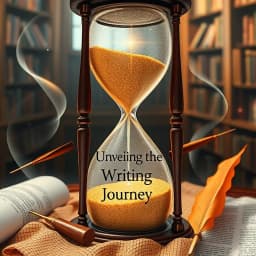
How Long Did It Take JK Rowling to Write the First Harry Potter
Find this useful? Bookmark ( CTRL/CMD + D ) for quick access!
Try an example:
Writing Timeline Analysis
Author Productivity Insights
Literary Research Tool
Book Development Tracking
Creative Writing Workshops
Historical Context Exploration
Explore Similar Tools
Recent Generations
the amount paid directly to you. Yes it is possible in future cases to request direct payment to the provider, Rephrase and give me polished email.
we have processed the claim as per the attachments in the claim submission we have processedthe invoice for Saul Holding. We dont have invoice for the Salofalk.
this additional information is very important. this adiitional information was requested by our clinical team. Without clinical review claim not be paid so please share the below additional information
How Long Did It Take Jk Rowling To Write The First Harry Potter
How Long Did It Take Jk Rowling To Write The First Harry Potter is an insightful AI-powered tool that helps users uncover the timeline of J.K. Rowling's writing journey for the beloved Harry Potter series. This innovative solution combines historical data analysis with literary insights to deliver a comprehensive understanding of the creative process behind one of the most successful book franchises in history.
Key Capabilities
- Detailed Timeline Analysis: Discover the exact duration it took Rowling to write the first Harry Potter book, providing context to her creative journey.
- In-depth Research Insights: Access a wealth of information about Rowling's writing habits, challenges, and milestones during the creation of Harry Potter and the Philosopher's Stone.
- Comparative Writing Studies: Compare Rowling's timeline with other authors, offering a broader perspective on writing processes and timelines in the literary world.
- User-Friendly Interface: Navigate easily through the tool's features, making it accessible for both casual readers and literary scholars.
Who It's For
Designed for literary enthusiasts, aspiring authors, and educators, How Long Did It Take Jk Rowling To Write The First Harry Potter excels in providing valuable insights into the writing process. Whether you're a fan of the series looking to deepen your understanding or a writer seeking inspiration from Rowling's journey, this tool enhances your appreciation of storytelling.
Why Choose How Long Did It Take Jk Rowling To Write The First Harry Potter
What sets this tool apart is its focus on the intricate details of Rowling's writing timeline, making it the ideal solution for anyone interested in the behind-the-scenes of literary creation. Gain unique insights that can inspire your own writing endeavors or enrich your discussions about the Harry Potter phenomenon.
Ready to transform your understanding of literary creation? Start using How Long Did It Take Jk Rowling To Write The First Harry Potter today and experience the magic behind the writing process!
Enhance Your Work with How Long Did It Take JK Rowling to Write the First Harry Potter
Leverage the power of AI to streamline your tasks with our How Long Did It Take JK Rowling to Write the First Harry Potter tool.
Timeline Estimation
Accurately estimates the time taken by J.K. Rowling to write the first Harry Potter book based on various factors.
Detailed Writing Journey
Explores the writing process, including drafts, revisions, and milestones throughout the creation of the book.
Historical Context
Provides context about the time period and events that influenced J.K. Rowling during her writing journey.
How How Long Did It Take JK Rowling to Write the First Harry Potter Works
Discover the simple process of using How Long Did It Take JK Rowling to Write the First Harry Potter to improve your workflow:
Input Your Query
Enter your question regarding the writing timeline of J.K. Rowling's first Harry Potter book.
Analyze Writing Duration
The tool processes historical data and timelines related to J.K. Rowling's writing journey.
Retrieve Information
The AI retrieves relevant information and insights based on your query.
View Results
Review the detailed results, including the estimated time it took for J.K. Rowling to write the first Harry Potter book.
Use Cases of
How Long Did It Take JK Rowling to Write the First Harry Potter
Explore the various applications of How Long Did It Take JK Rowling to Write the First Harry Potter in different scenarios:
Author Research
Explore the timeline of J.K. Rowling's writing process for the first Harry Potter book to understand the dedication and time investment required for successful authorship.
Writing Workshops
Utilize the insights from Rowling's writing duration to design workshops that help aspiring authors manage their time effectively while working on long-term writing projects.
Literary Studies
Incorporate the timeline of Rowling's writing into academic discussions about the creative process and the factors that influence the duration of writing a novel.
Motivational Speaking
Use Rowling's experience and the time it took her to write the first Harry Potter book as a case study in motivational talks to inspire perseverance and resilience in creative endeavors.
Who Benefits from How Long Did It Take JK Rowling to Write the First Harry Potter?
AI-Powered Efficiency
From individuals to large organizations, see who can leverage How Long Did It Take JK Rowling to Write the First Harry Potter for improved productivity:
Literature Enthusiasts
Discover the creative process behind beloved literary works and gain insights into authorship.
Aspiring Writers
Learn about the time commitment involved in writing a novel to better plan your own writing journey.
Harry Potter Fans
Enhance your appreciation for the series by understanding the effort and time invested in its creation.
Academic Researchers
Analyze the writing timelines of authors to study trends in literature and publishing.
Frequently Asked Questions
How long did it actually take J.K. Rowling to write the first Harry Potter book?
J.K. Rowling took about six years to write 'Harry Potter and the Philosopher's Stone', starting in 1990 and finishing in 1996.
What inspired J.K. Rowling to write Harry Potter?
J.K. Rowling was inspired by a train journey from Manchester to London in 1990, where the idea of a young boy attending a school for wizards came to her.
Did J.K. Rowling face any challenges while writing the first book?
Yes, Rowling faced numerous challenges, including financial struggles and multiple rejections from publishers before finally getting a deal with Bloomsbury.
How many drafts did J.K. Rowling write before publishing the first Harry Potter book?
J.K. Rowling wrote several drafts of 'Harry Potter and the Philosopher's Stone' before it was published, refining the story and characters through extensive revisions.
What was the initial reception of the first Harry Potter book?
The initial reception was positive, with critics praising its imaginative storytelling and engaging characters, leading to its eventual success and popularity.
































